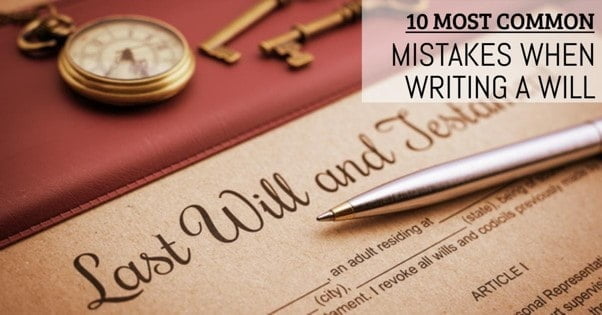
Writing your will helps to distribute your assets and makes the process faster and cheaper for your loved ones in the event you pass away. As you might have already known, you do not really need a lawyer to draft your will. And yes, you can write your own will. However, do take note of the following common mistakes, so that your last wishes can be fulfilled.
This guide highlights some of the common mistakes you may wish to avoid when writing your will.
Mistake #1: Planning Only for Death, and Not Life

Your will comes in useful when you die. But have you considered what happens in the event you meet with a serious accident, suffer a stroke or dementia? If you wish to provide and take care of the needs of your loved ones, just simply writing your will would be incomplete if it only addresses what happens upon your death. You may wish to address what happens while you are still alive. This is best accomplished by preparing complementary documents such as the Lasting Power of Attorney (LPA) and Advanced Medical Directive.
Why do you need LPA when writing your will?
When you make an Lasting Power of Attorney (LPA), you legally appoint someone you trust to decide and act on your behalf if you should lose the mental capacity to make decisions on your financial and personal matters. If you do not make an LPA and subsequently lose your mental capacity, one of your family members would need to apply to the Court for an order to appoint him/her as a deputy to make decisions on your behalf. Such court applications would usually involve spending much time and money.
What is Advanced Medical Directive?
Advanced Medical Directive is a legal document that you sign in advance to inform the doctor treating you, in the event, you become terminally ill and unconscious, that you do not want any extraordinary life-sustaining treatment to be used to prolong your life.
Mistake #2: Not Considering How You Want Your Debts to Be Paid

Your family members would not be responsible for the debts left behind by you if you should pass away. However, in the event you have a personal loan taken jointly with a family member, that family member would have to assume the responsibility to repay the loan.
If you took a mortgage loan from a bank to finance a property, the joint owner of this property would have to take over the repayment of the mortgage loan upon your death. For HDB flats, it is compulsory for flat owners to buy mortgage insurance. However, for private properties, it is not compulsory to buy such mortgage insurance. It would be prudent for owners of private properties to consider buying mortgage insurance to protect their loved ones from the sudden financial burden of a mortgage loan.
Any debts left unpaid by you upon death will have to be paid out of your estate before your executor is able to distribute the remaining estate to the beneficiaries under your will.
Mistake #3: Bequeathing Only Physical Assets

In this digital era, overlooking online assets such as social media accounts and email accounts is a common blunder that is overlooked when preparing wills. Some of these assets, such as digital photos, might hold financial or sentimental value. Others, like login credentials, could be misused if distributed to someone you had not intended to.
If you have online accounts, it may be important to bequeath your digital information and property in your will. Your loved ones need to be able to log into your accounts, get the information they need, and close those accounts based on your instructions in your will.
Mistake #4: Distributing Property When the Property is Not Part of the Estate

Although there are many ways to distribute your assets, one easy way is to distribute your entire estate to your beneficiaries by percentages or fractions.
Should you wish to leave your property to specific individuals, do note that if you are not the sole owner of this property, check if the property is held in joint tenancy. Properties held in joint tenancy cannot be willed to someone else. This is because, for properties held in joint tenancy, the surviving owner takes ownership of the entire property automatically. Basically, joint tenancy supersedes intentions of any will. For a property that is held as tenants-in-common, you can will away your share of the property. It is possible to convert a joint tenancy to tenants-in-common, but you will need to get a conveyancing lawyer to do the legal documentation.
Mistake #5: Distributing CPF Money and Insurance Policy Proceeds Through Your Will

CPF money does not form a part of the estate and cannot be distributed by your will. For CPF money, you will have to make a nomination under the CPF Act.
For insurance policy proceeds, procedures are a little more complicated. Whether your will can determine the beneficiaries for your insurance policy depends on the kind of nomination that you make for your insurance policy.
Under the Insurance Act, you can make a trust nomination to benefit your spouse and children. When you make a trust nomination, you lose all rights to the ownership of the policy. The benefits of the policy no longer belong to you and are therefore not yours to distribute in your will.
Alternatively, you can also make a revocable nomination under the Insurance Act. Such a nomination can be revoked, and therefore can be distributed according to your will.
Mistake #6: Not Choosing the Right Witnesses for Your Will

For the signing of your will, you need to have 2 adult witnesses to your will.
Note that the 2 witnesses must not be beneficiaries or spouses of your beneficiaries in your will. This legal requirement ensures that the witnesses do not have a direct interest in your estate and as such would be impartial.
Failing to choose the right witnesses to your will could lead to your will becoming invalid.
Witnesses should preferably be literate and reliable individuals who would be able to help support the validity of the will should there be any doubts raised in Court, if the will becomes contested.
Mistake #7: Surprising Your Executor

It is important to discuss and inform your family member or friend before you appoint them as your executor in your will. It is probably not a good idea to “surprise” the executor of their appointment.
As the executor’s signature on the will is not necessary, there may be situations whereby the appointed executor had not been made aware of his or her appointment. In cases whereby the executor is unwilling to take on the role, it would mean that there would be additional costs and time delay in court applications to appoint a substitute administrator for the estate.
Mistake #8: Not Writing a New Will After Marriage

Some people forget that generally, a will is automatically revoked upon marriage or re-marriage. The exception is if the will expressly contemplate the marriage. Therefore, remember to write a new will after your marriage.
Mistake #9: Not Writing a New Will After a Divorce

A divorce does not revoke a will. You may have previously made a will to distribute your assets to your ex-spouse after your death, and this will remain valid even when your marriage has legally ended if you have not created a new will.
Remember that an estranged couple going through a separation is still a legally married couple, and if you have not done a will then under the provision of the Intestate Succession Act, the estranged spouse could very well inherit 50% of deceased’s estate. Further, as most couples hold their matrimonial home as joint tenants, under the right of survivorship, the other spouse will inherit the whole of the property upon the death of one spouse.
Hence, it is crucial to re-write your will if you are planning to go through with a divorce. If you have made a will previously, it is time to review it, having gone through a divorce. Appoint an appropriate executor to distribute your assets per your wishes and a reliable trustee to provide for your young children if anything untoward happens to you.
Mistake #10: Not Having a Residuary Clause

A residuary clause is a ‘catch-all’ clause that describes how to distribute the rest of the assets that you have not accounted for. This clause is useful in the case that you do not provide beneficiaries for all your assets. A residuary clause covers the rest of your property that has not been specifically mentioned in your will. Without such a clause, you risk having a complicated probate case in which assets not covered by the will end up being distributed by intestacy laws instead of according to your wishes.
Bonus: Will Writing for Expatriates

For expatriates, if you have assets here in Singapore, different inheritance laws may apply to different types of assets.
For immovable properties such as apartments, local inheritance laws apply. However, for movable properties such as bank accounts, stock, and shares, the governing laws on inheritance would be your home country’s inheritance laws.
It is advisable to seek professional advice when drawing up a will to ensure that your concerns are dealt with appropriately. In situations of expatriates owning assets in Singapore, you may wish to consult a lawyer who is experienced with inheritance matters in Singapore for advice.

Hiring a lawyer to help with your will preparation helps reduce the likelihood of your will being contested, and minimize leakages of wealth through taxes or complicated probate applications.
It is not a legal requirement to engage a lawyer to draft your will. However, professional fees charged for preparing a will is affordable and as such, it would be unwise of any person to attempt to create a DIY will, and risk having the will found to be invalid upon his/her death.
People most commonly engage a lawyer to make one’s will for several benefits, including:
- Obtaining professional advice on the distribution of your assets
- Ensuring clarity of the will
- Avoiding mistakes during the drafting procedure
- Reducing the likelihood of your will being contested
At PKNG, we have helped countless individuals prepare wills of various complexities, sparing our clients the stress and anxiety of doubts. Planning ahead and getting your will, other legal documents and medical directives in order can give you and your family peace of mind today and in the future. Contact us for a consultation on your will, probate, and estate matters today.

Ng Pui Khim is a senior lawyer with over 20 years of private practice experience focusing on divorces (family and matrimonial law), real estate (conveyancing practice), wills and succession law.
All rights reserved. Any information of a legal nature in this website is given in good faith and has been derived from resources believed to be reliable and accurate. The author of the information contained herein this website does not give any warranty or accept any responsibility arising in any way, including by reason of negligence for any errors or omissions herein. Readers should seek independent legal advice
